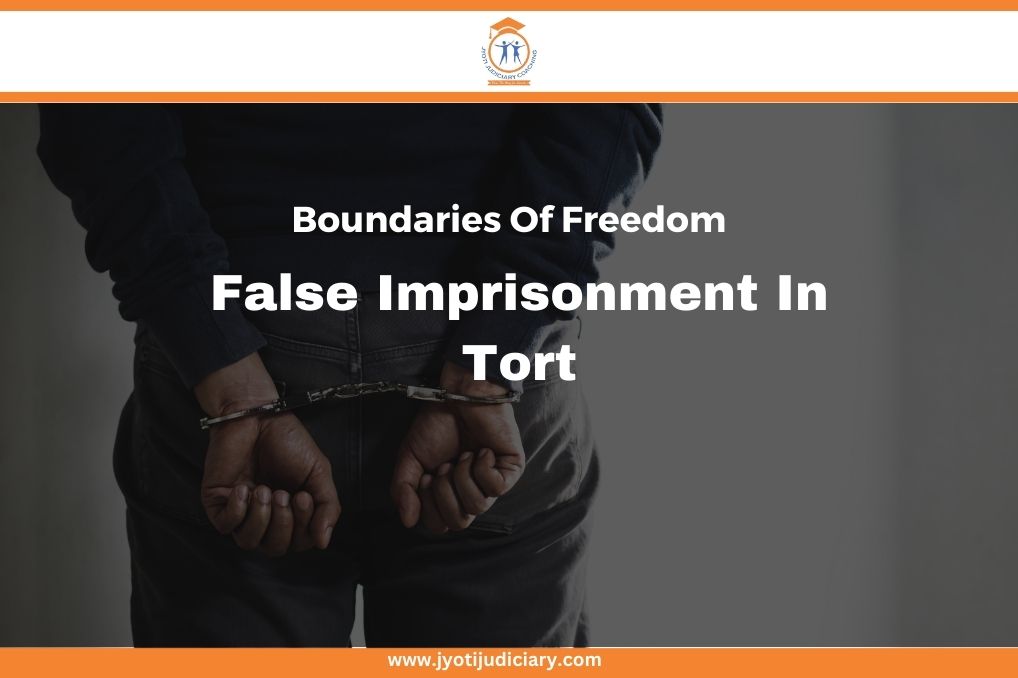
One of the fundamental principles of civilization, freedom is sometimes taken lightly until it is arbitrarily restricted. In the context of civil law, the act of false imprisonment is an unacceptable violation of this highly cherished liberty. false imprisonment in tort sheds light on the narrow boundaries that separate personal freedom and accountability in a civilized society.
False imprisonment meaning
- As per the definition of false imprisonment, it describes the deliberate act of limiting someone’s freedom of movement without a valid reason.
- It entails purposefully holding someone against their will, without their permission, and a court order.
- False imprisonment can happen in a lot of situations, like public areas, workplaces, and medical institutions, among others.
Example of false imprisonment
- False imprisonment includes the unjustifiable detention of a person by a police officer or security guard because of their appearance or usage of certain religious symbols.
- In the nursing profession, it is deemed false imprisonment when a patient is abused or neglected by their caretakers while they are in a hospital or nursing home, or when they are prevented from seeing their family members. It also includes purposefully giving patient medication against their will when they are threatened physically or psychologically.
Elements of false imprisonment tort
Every state has legislation against wrongful imprisonment aimed at preventing individuals from being detained against their will. State laws differ, but generally, a claim involving false imprisonment needs to include a few certain elements in order to be validated. The following elements must be present in order to establish a false imprisonment claim in a civil suit:
- Willful Detention: False imprisonment or restriction needs to be deliberate or willful. It is neither unlawful confinement nor false imprisonment when the door is accidentally closed while someone is on the other side. Wilful detention refers to any purposeful constraint, including physically preventing someone from leaving a building, room, or other location, as well as preventing someone from leaving via coercion or threats.
- Element of Intention: False imprisonment is usually considered a tort that requires intentionality. False imprisonment is not punishable by law unless the act is performed with the intent to impose a confinement or with the knowledge that it will almost certainly result in one. The purpose of this tort is unimportant. Judges often have the duty to ascertain the defendant’s intention in a false imprisonment case based on the evidence, as a matter of fact.
- Knowledge of the Complainant: It is not necessary for the plaintiff alleging false imprisonment against another person to have known at the time of the other person’s confinement that they were a hindrance to their freedom.
What Does Not Constitute false imprisonment?
To constitute false incarceration, the normal definition of imprisonment is not required. False incarceration occurs when someone is deprived of their personal freedom, whether by being kept behind four walls or by being unable to leave their current location.
The following components are necessary for the false imprisonment tort:
- An individual’s freedom should be completely limited.
- It ought to be done without any legitimate explanation or good reason.
False imprisonment does not encompass all forms of constraint, particularly if none of the aforementioned components are present.
False Imprisonment in Tort: Defences
- Valid Arrest: An arrest does not qualify as wrongful imprisonment if it is made in accordance with the law and there is sufficient reason to suspect that the subject is engaging in illegal activity.
- Consent to Restraint: An individual cannot assert that they were imprisoned as a victim if they were confined with their agreement and there was no fraud involved.
- Probable Cause: The false arrest or imprisonment entirely fails to establish probable cause through conduct. It is well recognized that the plausible cause criteria for detention are objectively based on real crimes against individuals rather than being based on actual crimes.
False imprisonment court cases
- In the case of Bird v Jones, this case established the rule that, as long as the victim is bound within a designated area, false imprisonment can occur even in situations in which the victim is not physically confined.
- In the case of Whittaker v Sanford, this decision established that, if they have good reason, retailers are allowed to hold and question anybody they suspect of theft. The ruling made it clear that when retailers take reasonable precautions to safeguard their assets, false imprisonment might not be applicable.
false imprisonment tort law may be from carelessness on the part of the defendant or from hostile purposes, but either way, the plaintiff is harmed. Article 21 is violated by false imprisonment, which also affects a person’s right to life and freedom of movement. A person who has been wrongfully imprisoned may file a lawsuit against the person who violated their rights. You have the right to sue anyone in a court of law who is interfering with your fundamental rights.
A writ of habeas corpus, self-help, nominal and compensatory damages, and an action for loss are the available remedies for false imprisonment.
False Imprisonment in Tort FAQs
- What are the essential requirements for false imprisonment?
In both civil and criminal courts, someone who knowingly restricts another person’s freedom faces charges of false imprisonment. False imprisonment is defined by three things: wilful detention, knowledge of the plaintiff, and intention.
- What is the limitation for compensation for false imprisonment?
Article 19 allows for compensation suits for wrongful imprisonment, with a one-year statute of limitations after the conclusion of the detention.
- What is liable for false imprisonment?
When someone restrains another person and places them in a confined space, that person has committed false imprisonment. Both criminal and tort laws can be used to punish false incarceration.
- What does the plaintiff need in an action for false imprisonment?
It is not necessary for the plaintiff to be aware that they were imprisoned at the specified time in order for there to be false incarceration. Whether or not the plaintiff knew that the detention was false does not matter in a false imprisonment case.
- What are the objectives of false imprisonment?
Preserving an individual’s freedom of movement without interference is the aim of the tort of false imprisonment. Therefore, without any legitimate reason, an individual’s freedom should be completely restricted for a set amount of time.
- What is without lawful justification in false imprisonment?
There must be no sound legal basis or logical reasoning for the detention; it must be totally illegal.
- How do you establish the tort of false imprisonment?
False imprisonment is a tort that occurs when someone’s personal freedom or freedom of movement is unlawfully restricted. Thus, imprisonment or constraint against a person’s will and unlawfulness of the custody or restriction are two necessary components of wrongful imprisonment.
- What is the punishment for false imprisonment in India?
The punishment for wrongfully confining someone is either a fine of up to one thousand rupees or a period of imprisonment of any kind, up to a year.
- Is false imprisonment a tort of negligence True False?
A negligent tort is a false imprisonment. One deliberate tort is false imprisonment. It is the wilful, unwarranted detention of an unwilling subject. The most common source of false imprisonment claims in the corporate world is shoplifting.
- Which coaching is best for judiciary?
The most effective judiciary coaching in Jaipur is provided by Jyoti Judiciary Coaching. The objective is to create a comfortable learning environment for the students. It makes the difficult task seem easy, which increases the likelihood of achieving the desired outcome. The objective at Jyoti Judiciary is to give students the best possible education possible. The Institute pledges to use every resource at its disposal to provide you with the finest preparation for the Judicial Services entrance examinations.
- Which coaching is best for RJS preparation?
Renowned Jaipur coaching program “Jyoti Judiciary Coaching” aids students in getting ready for the RJS exam. The finest online and offline RJS coaching program in Jaipur, Jyoti Judiciary, enables a methodical approach to preparing for the RJS examination. Their curriculum has been carefully designed to cover all the subjects and courses necessary for passing the Rajasthan Judicial Services Exams.
To give students the best coaching available for law entrance exams including the CLAT, AILET, and various other state judiciary exams, Jyoti Judiciary Coaching, India’s Finest educational Platform, was established. Come enroll now with Jyoti Judiciary!
For any latest news, legal topics, judiciary exams notifications, patterns, etc watch Jyoti Judiciary’s YouTube channel for legal videos for any updates at https://youtube.com/@jyotijudiciarycoaching4852?si=2cwubh9d2A9urwJf










